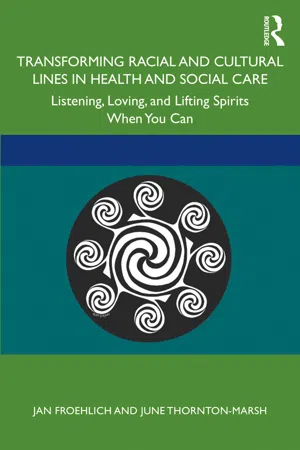
Transforming Racial and Cultural Lines in Health and Social Care
Listening, Loving, and Lifting Spirits When You Can
- 240 pages
- English
- ePUB (mobile friendly)
- Available on iOS & Android
Transforming Racial and Cultural Lines in Health and Social Care
Listening, Loving, and Lifting Spirits When You Can
About This Book
This book proposes an innovative new model for transforming racial and cultural lines in health and social care through communication processes, and introduces listening partnerships as a cost-effective, sustainable intervention to improve communication skills.
Transforming Racial and Cultural Lines in Health and Social Care walks the reader through the process of developing the essential skills for racially and culturally effective and compassionate communication. Divided into four parts, the book includes examples that highlight the significance of each skill and provides listening partnerships on each topic. In the final part of the book, Froehlich and Thornton-Marsh interview medical, health, and social care practitioners regarding their experiences in using racially and culturally effective communication to transform health and social care. Improved communication enhances the experience of health and social care for both patients and practitioners and ultimately supports better health outcomes.
Transforming Racial and Cultural Lines in Health and Social Care is essential reading for health and social care students looking to improve their communication skills and provide better care.
Frequently asked questions
Information

11
HOPES AND VISIONS FOR HUMAN AND PLANETARY HEALTH
Voices of frontline workers as leaders
Voices of health and social care practitioners
What are you proud of and appreciate about being a __________ and about your profession as a whole?
What is hard, difficult, or challenging about being a ______________?
Table of contents
- Cover
- Half Title
- Title Page
- Copyright Page
- Dedication
- Table of Contents
- List of Figures
- List of Tables
- List of vignettes
- PREFACE
- ACKNOWLEDGEMENTS
- PART IOne human race with a tapestry of cultures: A communication process for transforming racial and cultural lines in health and social care
- PART II Refinement of racially and culturally effective communication in health and social care
- PART III Deepening and restoring connections within and across racial and cultural lines
- PART IV Garnering love, hope, and leadership for human and planetary health
- References
- Index